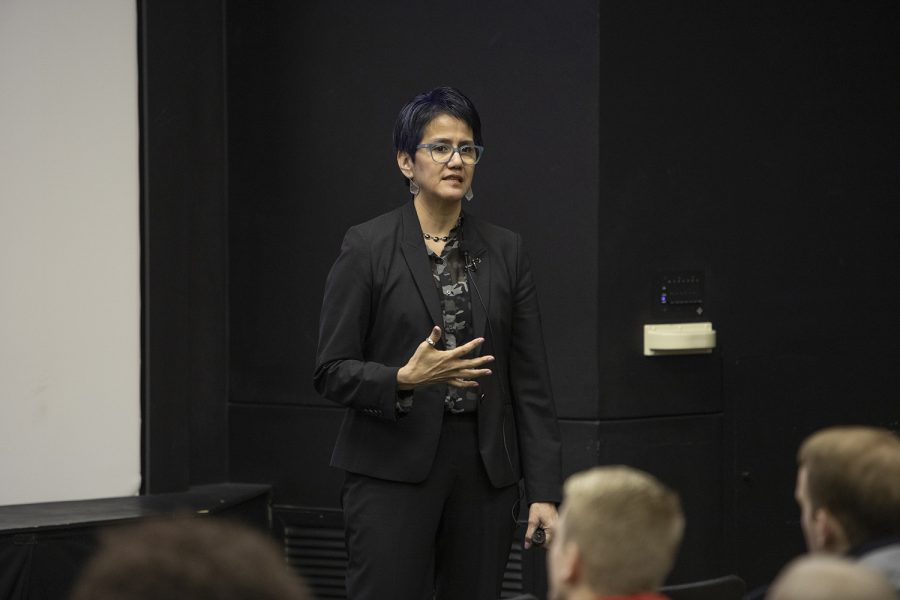Second associate VP for Diversity, Equity, and Inclusion candidate visits UI
The second finalist in the search for an Associate Vice President for Diversity, Equity, and Inclusion, Domino Renee Perez, visited campus, calling for change.
Associate English professor at the University of Austin-Texas Domino Renee Perez speaks at the Vice President for Diversity and Inclusion forum on Thursday, March 14, 2019
March 14, 2019
University of Iowa faculty, staff, and students gathered in the IMU for a public forum on Thursday to hear the second candidate to become the associate vice president for diversity, equity, and inclusion, Domino Renee Perez, present her qualifications for the job.
Currently serving as the first Latinx female associate professor in the English Department at the University of Texas-Austin, Perez said she understands how a state university does not always mirror the state’s population, and changes in idea, policy, and form take time.
“It is a large task to transform a university and an environment,” Perez said. “So it’s good to see the UI is dedicated to that endeavor.”
During her visit to campus, she said, UI community members were all welcoming, forthcoming, honest, and warm. She appreciates the preparations the university has in place to help incoming administrators transition into a new position, she said.
In addition to transparency in policy, consultation at all levels, internal and external partnerships, direct communication among administrators, and emotional intelligence on campus, Perez emphasized the need for community building with legislators, students, alums, and others.
“I know that not everyone is on board with diversity, equity, and inclusion,” Perez said. “Either way, those people still need to be reached out to. The person in this position needs to build relationships and, in some situations, rebuild trust.”
RELATED: Meenakshi Gigi Durham emerges as first candidate in UI associate VP search
In regard to her long-term goals for UI diversity, equity, and inclusion, Perez said a full assessment of resources and reports would be necessary to adapt to a changing environment while remaining true to the university’s mission.
“There are programs that are very similar, and the left hand doesn’t know what the right hand is doing,” Perez said. “So bringing those different efforts together, that to me seems very important.”
If selected, she said, she would implement a series of forums called I.D.E.A.S., that would focus on inclusion, diversity, equity, accessibility, and strategies. Hopefully, she said, the forums would form a good base for development or fundraising.
Jodi Graff, the administrative director of the Graduate and Postdoctoral Studies Office at the Carver College of Medicine, asked Perez to elaborate on her process of establishing an external community advisory board at Texas to raise funds for the Center of Mexican American Studies.
“You had spoken about your experience supporting and being part of capital campaigns, and you also shared your experience in creating an external community advisory board,” Graff said.
Perez described the importance of balancing a college concern with the concerns of the university as a whole by bringing in external funding through the establishment of an advisory council.
Women’s Resource & Action Center Associate Director Martha Pierce asked about Perez’s thoughts on teaching diversity, equity, and inclusion “for folks who hold majority identities and may not already see value in diversity, equity, and inclusion.”
Perez responded by saying that one of the biggest roadblocks to the promotion of diversity, equity, and inclusion is the false understanding from majorities that it will take away from them, when it will actually lift everyone up.
“To get people to buy in is one of the more arduous jobs that I’ve had,” Perez said. “Diversity is something we should celebrate on campus. Diversity, equity, and inclusion isn’t taking anything away from you, it’s actually adding to the overall experience of the university.”



